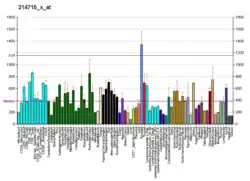ZNF160
Zinc finger protein 160 is a protein that, in humans, is encoded by the ZNF160 gene.[3][4][5]
The protein encoded by this gene is a Krüppel-related zinc finger protein which is characterized by the presence of an N-terminal repressor domain, the Kruppel-associated box (KRAB). The KRAB domain is a potent repressor of transcription; thus this protein may function in transcription regulation. Two alternative transcripts encoding the same isoform have been described.[5]
References
- GRCh38: Ensembl release 89: ENSG00000170949 - Ensembl, May 2017
- "Human PubMed Reference:". National Center for Biotechnology Information, U.S. National Library of Medicine.
- Halford S, Mattei MG, Daw S, Scambler PJ (Jul 1995). "A novel C2H2 zinc-finger protein gene (ZNF160) maps to human chromosome 19q13.3-q13.4". Genomics. 25 (1): 322–3. doi:10.1016/0888-7543(95)80149-G. PMID 7774943.
- Abrink M, Aveskogh M, Hellman L (Mar 1995). "Isolation of cDNA clones for 42 different Kruppel-related zinc finger proteins expressed in the human monoblast cell line U-937". DNA Cell Biol. 14 (2): 125–36. doi:10.1089/dna.1995.14.125. PMID 7865130.
- "Entrez Gene: ZNF160 zinc finger protein 160".
Further reading
- Kimura K, Wakamatsu A, Suzuki Y, et al. (2006). "Diversification of transcriptional modulation: large-scale identification and characterization of putative alternative promoters of human genes". Genome Res. 16 (1): 55–65. doi:10.1101/gr.4039406. PMC 1356129. PMID 16344560.
- Ota T, Suzuki Y, Nishikawa T, et al. (2004). "Complete sequencing and characterization of 21,243 full-length human cDNAs". Nat. Genet. 36 (1): 40–5. doi:10.1038/ng1285. PMID 14702039.
- Strausberg RL, Feingold EA, Grouse LH, et al. (2003). "Generation and initial analysis of more than 15,000 full-length human and mouse cDNA sequences". Proc. Natl. Acad. Sci. U.S.A. 99 (26): 16899–903. doi:10.1073/pnas.242603899. PMC 139241. PMID 12477932.
- Mark C, Looman C, Abrink M, Hellman L (2001). "Molecular cloning and preliminary functional analysis of two novel human KRAB zinc finger proteins, HKr18 and HKr19". DNA Cell Biol. 20 (5): 275–86. doi:10.1089/104454901750232472. PMID 11410164.
- Hattori A, Okumura K, Nagase T, et al. (2001). "Characterization of long cDNA clones from human adult spleen". DNA Res. 7 (6): 357–66. doi:10.1093/dnares/7.6.357. PMID 11214971.
- Nagase T, Kikuno R, Nakayama M, et al. (2001). "Prediction of the coding sequences of unidentified human genes. XVIII. The complete sequences of 100 new cDNA clones from brain which code for large proteins in vitro". DNA Res. 7 (4): 273–81. doi:10.1093/dnares/7.4.271. PMID 10997877.
This article is issued from Wikipedia. The text is licensed under Creative Commons - Attribution - Sharealike. Additional terms may apply for the media files.


